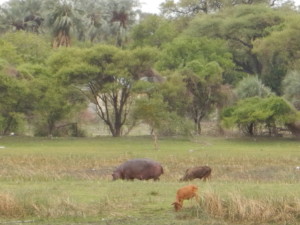
I am an academic and academics are always looking for ways to fund their research and outreach. Our bread-and-butter employment usually involves teaching, which can have tremendous impact by itself. But, the best teaching is grounded in natural inspiration and passion. For me, these wonderful attributes are built by doing field work.
And there-in lies the irony of academic life. The best teachers rarely teach all the time, but to be released from teaching, we must find external funding. We must persuade someone, other than our university, to support us while we develop skills, innovate, contribute expertise, build networks, solve problems, learn, and achieve beyond the normal boundaries of our campus and our discipline.
In my case, my Botswana fieldwork is being funded by the Fulbright Scholars Program and the U.S. State Department. While in Botswana, one of my objectives is to find my next external funding opportunity. It’s always like that. You have to plan forward.
Today, I am reading the USAID website, looking for funding. USAID is the United States Agency for International Development. They fund numerous projects in Sub-Saharan Africa as well as Asia, Europe and Eurasia, Latin America and the Caribbean, and the Middle East. They have the “twofold purpose of furthering America’s interests while improving lives in the developing world.”
USAID specifically supports improvements in
- Agriculture and Food Security
- Democracy, Human Rights and Governance
- Economic Growth and Trade
- Education
- Ending Extreme Poverty
- Environment and Global Climate Change
- Gender Equality and Women’s Empowerment
- Global Health
- Water and Sanitation
- Working in Crises and Conflict
As I read this list, I am looking for ways to connect my expertise with these needs. But, in fact, my expertise crosses through several of these areas and I am hard pressed to pick just one. So how should I focus my application if each of these areas is funded separately?
It’s not entirely clear to me how Global Health can be managed separately from Water and Sanitation. Last I checked, clean water was needed for health. What about Environment and Global Climate Change? How is that separate from Water and Sanitation on the one hand (water being part of environment) and Economic Growth and Trade on the other (economic growth depends in part on burning fossil fuels, an activity that causes climate change).
To me, these areas of research and improvement are interwoven. Each impacts the others. To solve problems, an interdisciplinary approach is really needed. If you want to improve global health, you must address issues around water, environment, poverty, education, economics, crises, conflict, gender equality, food security, and governance. And that’s just one example.
Clearly I need to read more to figure out where my research fits in because I can’t apply to all of USAID’s programs at once.
And there’s another problem.
My research is interdisciplinary too.
I want to know how human activities impact water resources and how those impacts feed back on human and wildlife health. I tend to study the impacts of pesticides and fertilizers on water resources. “Water resources” includes water quality and quantity as well as resources associated with water, like fish. Clean drinking water and prolific, uncontaminated fisheries are immensely important to human well-being and health.
So how does my research match USAID priorities?
I’m thinking I’ll be somewhere within
- Environment and Global Climate Change
- Global Health
- Water and Sanitation
Well – that narrows it down nicely!